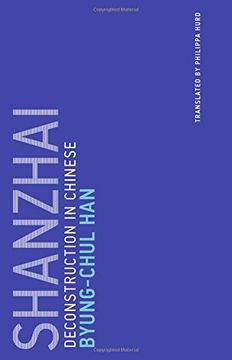
Shanzhai: Deconstruction in Chinese (Untimely Meditations) (en Inglés)
Byung-Chul Han (Autor) · Philippa Hurd (Traducido por) · MIT Press · Tapa Blanda
$ 12.57
$ 17.95
Ahorras: $ 5.39
Elige la lista en la que quieres agregar tu producto o crea una nueva lista
Ir a Mis Listas¿Tienes una pregunta sobre el libro? Inicia sesión para poder agregar tu propia pregunta.
